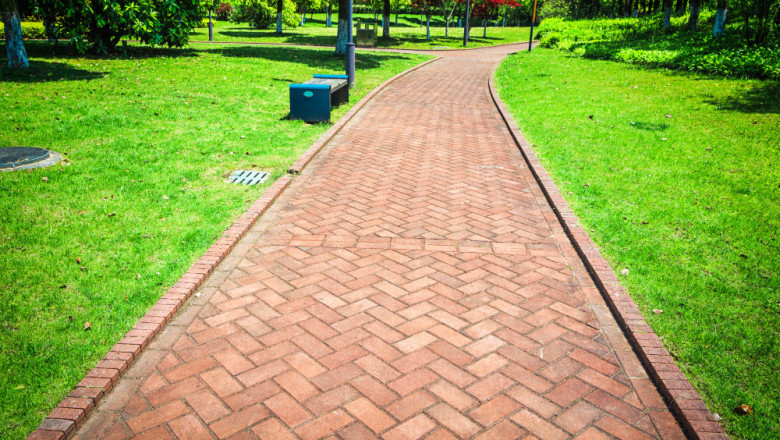views

Paver driveways are a popular choice for homeowners looking to enhance the curb appeal and functionality of their property. With a variety of materials, patterns, and designs available, pavers offer a durable and aesthetically pleasing solution for driveways. This guide provides comprehensive insights into the design, installation, and maintenance of paver driveways, ensuring that your investment remains beautiful and functional for years to come.
Designing Your Paver Driveway
When designing a paver driveway, consider the following elements:
● Material Selection: Choose from brick, cobblestone, concrete, or other materials, each offering unique advantages in style, cost, and maintenance.
● Pattern Choices: Popular patterns include herringbone, basketweave, and running bond, each providing different aesthetic and functional benefits.
● Color and Texture: Select colors and textures that complement your home's exterior and landscape design.
Installation Process
A successful paver driveway installation involves:
● Site Preparation: Proper grading and compaction of the base are crucial for a stable foundation.
● Laying Pavers: Pavers should be laid in the chosen pattern, ensuring even spacing and alignment.
● Edging and Joint Sand: Install edge restraints and fill joints with sand to secure the pavers in place.
Maintenance and Care
To preserve the beauty and integrity of your paver driveway, regular maintenance is essential:
● Cleaning: Remove debris and stains promptly to prevent discoloration and damage.
● Sealing: Apply a sealant to protect against weathering and enhance the color of the pavers.
● Weed Control: Address weed growth in the joints to maintain the driveway's appearance and stability.
By following these guidelines, you can enjoy a stunning and long-lasting paver driveway that adds value to your home. For more detailed information on each aspect of paver driveways, explore the resources provided. Remember, a well-designed and maintained paver driveway not only enhances the visual appeal of your property but also serves as a functional and durable surface for years to come.
Choosing the right material for your paver driveway is a critical decision that affects not only the aesthetics but also the longevity and maintenance of the driveway. Here's a comprehensive look at the pros and cons of various paver materials to help you make an informed choice.
Brick Pavers
Brick pavers are a timeless choice that offers a classic look. They are made from molded clay that is fired in a kiln, providing a range of colors and a unique charm.
Pros:
- Long lifespan with a classic aesthetic that may age well even with some weathering.
- Low maintenance; they require little effort to maintain their appearance.
- Eco-friendly as they are made from natural materials and can be reused or salvaged.
Cons:
- Can be expensive compared to other options.
- Somewhat fragile; they may crack or chip over time, especially under heavy load.
- Weeds can grow between the bricks if not properly maintained.
Concrete Pavers
Concrete pavers are versatile and come in a variety of shapes, sizes, and colors. They are made from a mix of concrete and aggregate.
Pros:
- Easy to install and come in a wide range of options.
- More affordable than brick pavers.
- Durable and can withstand heavy traffic.
Cons:
- Colors can fade over time due to the artificial pigments used.
- Can crack with extreme temperature changes.
- Require sealing to prolong their lifespan.
Bluestone Pavers
Bluestone pavers offer a distinctive look with their deep blue color and are often used in more elegant driveway designs.
Pros:
- Unique and attractive appearance.
- Durable and suitable for various outdoor applications.
- Versatile, as they can be cut into different shapes and sizes.
Cons:
- Can be slippery when wet, posing a safety hazard.
- Higher cost compared to concrete pavers.
- May require regular sealing to maintain their color.
Rubber Pavers
Rubber pavers are a newer option that is gaining popularity due to their safety features and eco-friendliness.
Pros:
- Shock-absorbent and slip-resistant, making them safe.
- Made from recycled materials, thus environmentally friendly.
- Less susceptible to chipping and cracking.
Cons:
- The finish may not be as attractive as stone or porcelain pavers.
- Limited design and color options.
- May not have the same prestige or value-adding potential as stone pavers.
When selecting paver materials, it's important to weigh these pros and cons against your specific needs, budget, and the climate of your area. Each material has its unique benefits and drawbacks, and the right choice will depend on a variety of factors including the desired look, load-bearing requirements, and maintenance commitment.
Selecting the right paver material for your climate is a crucial aspect of ensuring the longevity and durability of your driveway. Climate conditions such as temperature extremes, precipitation levels, and freeze-thaw cycles can significantly impact the performance and appearance of paver materials.
When choosing paver materials, it's also important to consider other factors such as the intended use of the driveway, aesthetic preferences, and budget. Consulting with a professional installer who has experience with local climate conditions can provide additional guidance and ensure that you select the best material for your need




















Comments
0 comment